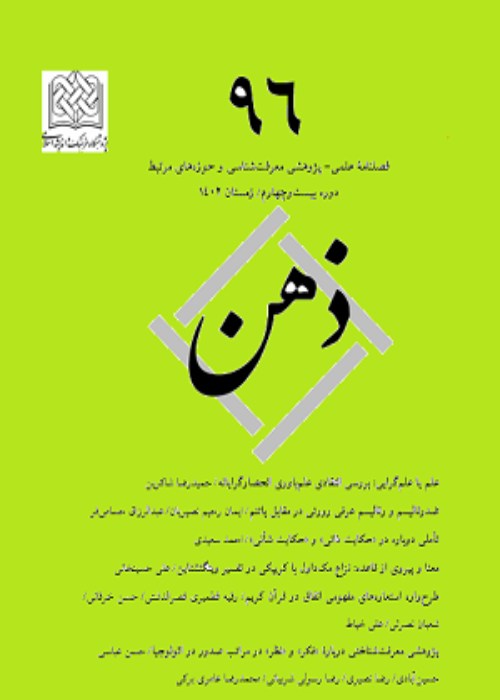Judgement and its Ratio With Truth, Falsity and Fault
Division into concept and Judgement is one of the famous divisions of the acquired knowledge. Among Islamic thinkers, the discussion of this division can be traced back to Farabi's words. After him, other Muslim logicians and philosophers paid attention to this debate and discussed it in their books. The discussion about this has also provoked differences that Mulla Sadra addressed in the treatise of concept and Judgement. In fact, in each of these views, attention has been paid to an aspect of the aspects of Judgement. Some have considered Judgement to be equal to the proposition, some have introduced its truth as an attribution, and some have considered it as a concept that accompanies the attribution. Another point of view that has been presented about the truth of Judgement is related to those who have considered it as understanding the truth of the proposition. With the investigations we have done in the article, we have shown that all these views have problems and each of them has only paid attention to one aspect of the various aspects of Judgement, and this has caused confusion in the definition of Judgement. Mulla Sadra acknowledged more attention to different dimensions of Judgement, so sometimes he called it a belief (a kind of tendency) and sometimes he called it a concept, which is the same as an attribution. It is better to combine these three and consider each of the meanings of "belief", "concept" and " attribution" as referring to one aspect of Judgement. The interpretation of "concept" refers to the epistemic aspect, the interpretation of "belief" refers to the tendentious aspect, and the interpretation of "attribution" refers to the active aspect of Judgement.
Methods of Study:
The method of discovery in this issue is library method and the method of evaluation is rational analytic.
To put it more clearly and based on the selected point of view, Judgement is a multi-faceted reality, and it can be acknowledged that these definitions are in fact mentioning different dimensions of Judgement, and Judgement is one of the things which has different aspects in harmony with the self, and this is the characteristic that distinguishes it from concept and at the same time makes Judgement a part of the types of knowledge.
Therefore, the Judgement of a truth is three-faceted, which is an epistemic passivity on the one hand, a dispositional passivity on the other hand, and the third face, which observes the active face of the self, is the verb of the self. The first aspect makes us consider Judgement as a type of concept. The second aspect has caused some people to consider it as a kind of acknowledgment and confession that is achieved passively for humans and has a tendency aspect. Sometimes, the expression of faith and belief is used to refer to this aspect, and finally, the third aspect has caused many logicians and philosophers to call Judgement the same as attribution or to call it a concept that accompanies the attribution. In fact, all of these are different aspects of the same truth, and by combining them (epistemic passivity, dispositional passivity, and active aspect), the truth of Judgement is confirmed and its distinction from concept is revealed. The last word is that what has been collected in this article is a library review of the views and their rational and philosophical analysis to lead to the selected theory which is the multifaceted nature of Judgement
Concept , Judgement , Proposition , Attribution , Truth , Falsity Fault
- حق عضویت دریافتی صرف حمایت از نشریات عضو و نگهداری، تکمیل و توسعه مگیران میشود.
- پرداخت حق اشتراک و دانلود مقالات اجازه بازنشر آن در سایر رسانههای چاپی و دیجیتال را به کاربر نمیدهد.



